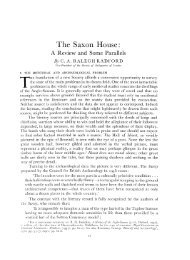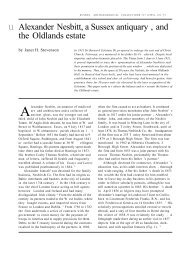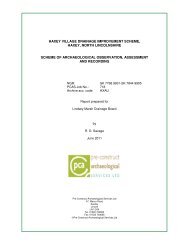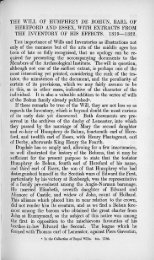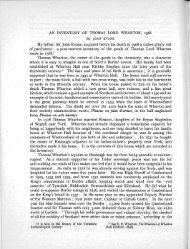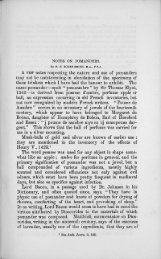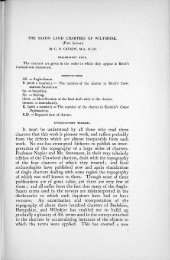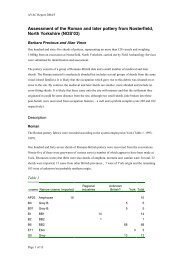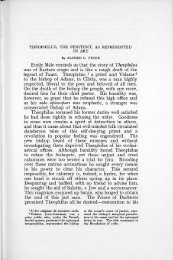ROMAN URBAN TOPOGRAPHY in Britain and the western Empire
ROMAN URBAN TOPOGRAPHY in Britain and the western Empire
ROMAN URBAN TOPOGRAPHY in Britain and the western Empire
You also want an ePaper? Increase the reach of your titles
YUMPU automatically turns print PDFs into web optimized ePapers that Google loves.
a premium <strong>in</strong> <strong>the</strong>se build<strong>in</strong>gs.<br />
A cut above this were <strong>the</strong> board<strong>in</strong>g-houses which<br />
offered quarters to both permanent residents <strong>and</strong> transient<br />
guests. S<strong>in</strong>gle bedrooms were provided for <strong>the</strong><br />
lodgers <strong>and</strong> a communal d<strong>in</strong><strong>in</strong>g-room <strong>and</strong> sitt<strong>in</strong>g-room<br />
were available for <strong>the</strong> guests, whose meals were prepared<br />
by a resident cater<strong>in</strong>g staff engaged by <strong>the</strong> proprietor. Life<br />
<strong>in</strong> such a board<strong>in</strong>g-house, or ra<strong>the</strong>r, a near-riot, is<br />
recorded <strong>in</strong> <strong>the</strong> Satyricon. Petronius’s hero has been<br />
caught by <strong>the</strong> manager do<strong>in</strong>g, as he mistakenly <strong>in</strong>terprets<br />
an equally disreputable episode, a midnight flit. The<br />
residents, loyal to <strong>the</strong>ir l<strong>and</strong>lord, set upon <strong>the</strong> defaulter<br />
(Satyricon, 95):<br />
Meantime Eumolpus was be<strong>in</strong>g set upon on both<br />
sides by cooks <strong>and</strong> tenants alike. One of <strong>the</strong>m kept<br />
jabb<strong>in</strong>g at his eyes with a loaded kebab skewer,<br />
ano<strong>the</strong>r snatched a fork from <strong>the</strong> sideboard <strong>and</strong><br />
struck a gladiatorial pose. But above all a blearyeyed<br />
old hag took <strong>the</strong> lead. Dressed <strong>in</strong> a filthy l<strong>in</strong>en<br />
house-coat <strong>and</strong> teeter<strong>in</strong>g on a pair of wooden clogs of<br />
different heights, she held onto a huge hound which<br />
she sicked on Eumolpus.<br />
This led to <strong>the</strong> police be<strong>in</strong>g called, who, like <strong>the</strong> fire<br />
brigade, contrived to cause more damage <strong>in</strong> establish<strong>in</strong>g<br />
<strong>the</strong> peace than <strong>the</strong> tenants had caused fight<strong>in</strong>g among<br />
<strong>the</strong>mselves.<br />
Cheek-by-jowl with establishments such as <strong>the</strong>se were<br />
<strong>the</strong> higher-class residences of <strong>the</strong> affluent or very rich.<br />
Few, <strong>in</strong> <strong>the</strong> major cities of <strong>the</strong> <strong>Empire</strong>, resided <strong>in</strong> <strong>the</strong><br />
traditional Roman-style house, or domus, with its series of<br />
rooms arranged around <strong>in</strong>ternal light-wells; life was more<br />
often lived <strong>in</strong> apartments <strong>in</strong> high-rise developments. Some<br />
of <strong>the</strong>se, like <strong>the</strong> Insula Felicula which towered above <strong>the</strong><br />
Pan<strong>the</strong>on <strong>and</strong> <strong>the</strong> Column of Marcus Aurelius <strong>in</strong> Rome,<br />
evoked astonishment <strong>and</strong> ridicule <strong>in</strong> <strong>the</strong>ir own time just<br />
as, for <strong>in</strong>stance, <strong>the</strong> Barbican scheme <strong>in</strong> <strong>the</strong> City of<br />
London does today. Needless to say, <strong>the</strong> same disregard<br />
for aes<strong>the</strong>tics, convenience, <strong>and</strong> amenity stimulated <strong>the</strong><br />
ancient property developer <strong>in</strong> his pursuit of profit as his<br />
modern counterpart. With<strong>in</strong> such build<strong>in</strong>gs each floor was<br />
divided <strong>in</strong>to suites of apartments offer<strong>in</strong>g a range of rooms<br />
which could be allocated functions by <strong>the</strong> tenants. The<br />
elegance that could be achieved can still be judged by some<br />
of <strong>the</strong> surviv<strong>in</strong>g structures at Ostia, <strong>the</strong>mselves not <strong>in</strong> <strong>the</strong><br />
highest class of aristocratic hous<strong>in</strong>g (Meiggs 1973).<br />
But it is not <strong>the</strong> architectural details of urban hous<strong>in</strong>g,<br />
or its <strong>in</strong>terior decoration, which are my ma<strong>in</strong> concern;<br />
ra<strong>the</strong>r it is <strong>the</strong> reconstruction of <strong>the</strong> form of tenure <strong>and</strong> <strong>the</strong><br />
quality of life. Some aspects of <strong>the</strong>se can be glimpsed <strong>in</strong><br />
<strong>the</strong> ancient legal texts. These date from <strong>the</strong> heyday of<br />
Roman jurisprudence, <strong>the</strong> early 3rd century, <strong>and</strong> are a<br />
compilation of judgements by <strong>the</strong> most em<strong>in</strong>ent lawyers of<br />
<strong>the</strong> day. Although <strong>the</strong>y date to <strong>the</strong> Severan period, <strong>the</strong>y<br />
represent a body of law which is <strong>the</strong> accumulated<br />
experience of a society, <strong>and</strong> <strong>the</strong>se cases reflect <strong>the</strong><br />
problems which arose over a long period of time between<br />
owners, occupiers, <strong>and</strong> purchasers of property.<br />
Generally speak<strong>in</strong>g, when not operated by <strong>the</strong>ir own<br />
agents, property was leased by owners to middlemen for<br />
exploitation, thus distanc<strong>in</strong>g <strong>the</strong> aristocracy from <strong>the</strong><br />
odium of commerce. These middlemen sub-leased units<br />
with<strong>in</strong> <strong>the</strong> property to sub-tenants. This led to a complex<br />
45<br />
Casey: The Roman hous<strong>in</strong>g marker<br />
legal situation, s<strong>in</strong>ce <strong>in</strong> Roman law <strong>the</strong> concept of usufruct<br />
was very firmly established. In essence this doctr<strong>in</strong>e<br />
established that a property owner had a strong right to<br />
exploit <strong>the</strong> value of <strong>the</strong> property <strong>and</strong> that noth<strong>in</strong>g, except<br />
<strong>the</strong> equal <strong>and</strong> conflict<strong>in</strong>g rights of o<strong>the</strong>r property owners,<br />
should impede that right. Thus an owner could term<strong>in</strong>ate<br />
a lease <strong>and</strong> repossess his property at any time. A very<br />
humble property transaction from Egypt makes this clear.<br />
It is a lease dat<strong>in</strong>g to AD 496 which reads, <strong>in</strong> part:<br />
I voluntarily undertake to lease.. .a room <strong>in</strong> good<br />
condition on <strong>the</strong> ground floor, fac<strong>in</strong>g <strong>the</strong> south, with<br />
all appurtenances <strong>and</strong> rights, <strong>and</strong> will pay a rent of<br />
one tremissis annually . . .<strong>and</strong> whenever you wish I<br />
will surrender to you <strong>the</strong> aforesaid room <strong>in</strong> <strong>the</strong><br />
condition which I received it for possession. (Pap<br />
Oxyrhync, 1889)<br />
In reality <strong>the</strong> owner could override <strong>the</strong> rights of his<br />
pr<strong>in</strong>cipal lessee <strong>and</strong> evict <strong>the</strong> sub-tenants. This might<br />
occur if <strong>the</strong> owner wished to redevelop his property to<br />
maximize his profits. In <strong>the</strong> event of a resale without<br />
redevelopment <strong>the</strong> sitt<strong>in</strong>g tenants had <strong>the</strong> right to cont<strong>in</strong>ued<br />
residence or to dem<strong>and</strong> accommodation of an equal<br />
st<strong>and</strong>ard elsewhere from <strong>the</strong> dispossessed pr<strong>in</strong>cipal lessee.<br />
On <strong>the</strong> whole, though, it was <strong>in</strong> <strong>the</strong> <strong>in</strong>terests of <strong>the</strong> owners<br />
<strong>and</strong> lessees to treat <strong>the</strong> tenants with commercial caution,<br />
s<strong>in</strong>ce ano<strong>the</strong>r Roman <strong>in</strong>stitution gave <strong>the</strong> tenant an<br />
<strong>in</strong>formal protection aga<strong>in</strong>st his l<strong>and</strong>lord. This was because<br />
<strong>the</strong> terms of a Roman lease on property made no provision<br />
for <strong>the</strong> rent to be paid <strong>in</strong> advance. Indeed <strong>the</strong> rent was<br />
normally paid at <strong>the</strong> term<strong>in</strong>ation of <strong>the</strong> lease or at <strong>the</strong> end<br />
of each year <strong>in</strong> <strong>the</strong> case of long leases. Property was let out<br />
on annual terms <strong>in</strong> many cases, or from two to five years.<br />
Leases term<strong>in</strong>ated on <strong>the</strong> last day of June, <strong>and</strong> 1 July was,<br />
<strong>the</strong>refore, a very important day <strong>in</strong> <strong>the</strong> Roman commercial<br />
calendar. For a period before <strong>the</strong> end of <strong>the</strong> lease <strong>the</strong><br />
l<strong>and</strong>lord could have access to <strong>the</strong> premises <strong>in</strong> order to<br />
show prospective new lessees around. This led to some<br />
arm-twist<strong>in</strong>g on both sides, <strong>the</strong> l<strong>and</strong>lord pressur<strong>in</strong>g <strong>the</strong><br />
sitt<strong>in</strong>g tenant to renew at a higher rent <strong>and</strong> <strong>the</strong> tenant<br />
try<strong>in</strong>g to call <strong>the</strong> l<strong>and</strong>lord’s bluff until <strong>the</strong> last moment.<br />
Failure to cl<strong>in</strong>ch a deal is <strong>the</strong> <strong>the</strong>me of one of Martial’s<br />
verses which describes <strong>the</strong> fate of a tenant who is reduced<br />
to trail<strong>in</strong>g around apartment blocks on 1 July plead<strong>in</strong>g for<br />
shelter from <strong>the</strong> porters <strong>and</strong> managers (xii.32.2W).<br />
The fear that <strong>the</strong> tenants would not pay <strong>the</strong> rent was a<br />
constant one, <strong>and</strong> Roman law allowed for <strong>the</strong> distra<strong>in</strong>t of<br />
goods so that <strong>the</strong> furniture could be seized by <strong>the</strong> l<strong>and</strong>lord<br />
<strong>and</strong> <strong>the</strong> tenant locked out. A f<strong>in</strong>e po<strong>in</strong>t of law arose <strong>in</strong> <strong>the</strong><br />
case of a slave who was locked <strong>in</strong> with <strong>the</strong> furniture as part<br />
of <strong>the</strong> household effects <strong>in</strong> law; he chose not to starve<br />
slowly to death whilst his master raised <strong>the</strong> arrears of rent,<br />
but hopped out of <strong>the</strong> w<strong>in</strong>dow <strong>and</strong> fled. It is conceivable<br />
that as <strong>the</strong> dread day of 1 July came closer, so <strong>the</strong> hot<br />
nights of late June witnessed <strong>the</strong> cl<strong>and</strong>est<strong>in</strong>e removal of<br />
furniture <strong>in</strong> towns across <strong>the</strong> Roman <strong>Empire</strong>. Martial<br />
(xii.32.14) aga<strong>in</strong> provides <strong>the</strong> image to suit <strong>the</strong> situation:<br />
Oh <strong>the</strong> kalends of July - I’ve seen you, Vaccera,<br />
creep<strong>in</strong>g off down <strong>the</strong> street with your few sticks of<br />
furniture carried by your red-headed wife. . . <strong>the</strong> bits<br />
<strong>the</strong> l<strong>and</strong>lord didn’t grab <strong>in</strong> lieu of two years’ rent.




